Middle East Tensions Escalate: Missile Attack Rocks Qatar
Recent events have underscored the precarious position of Gulf states caught between escalating hostilities involving Iran, the United States, and Israel. A missile attack attributed to Iran targeted a major U.S. military base near Doha, Qatar, transforming the usually serene capital into a scene of panic and disruption.
Witnesses in Doha described loud booms echoing across the city, visible interceptor missiles exploding mid-air, and shrapnel falling from the sky. The sudden violence prompted panicked shoppers in places like Villaggio Mall to seek cover, highlighting the stark reality of regional conflict reaching their doorstep.
The operation reportedly saw Iran fire missiles at Al Udeid Air Base in Qatar. This strike came in direct response to prior U.S. and Israeli aerial assaults on Iranian nuclear facilities, which utilized heavy munitions and targeted key sites. While Iranian state media hailed the missile attack as a “mighty and successful response,” analysis suggests the strike was a calculated, even performative, act designed to respond without triggering full-scale war with the U.S. Crucially, reports indicate the attack was pre-warned through backchannels, allowing the base to be evacuated and resulting in no casualties among U.S. personnel. Iran also claimed to have deliberately targeted an area outside populated zones, signaling a desire to de-escalate specifically with the United States, contrasting sharply with the significant casualties reported from earlier Israeli and Iranian strikes targeting populated areas and critical infrastructure elsewhere in the region.
Gulf States Caught in the Crossfire
For countries across the Gulf – including Saudi Arabia, the United Arab Emirates, Bahrain, Kuwait, and Oman – the attack on a U.S. base in Qatar represents a worst-case scenario. These nations have long balanced delicate relationships: relying on the U.S. as a primary security guarantor while simultaneously working to improve ties with regional power Iran.
Their fears of being involuntarily drawn into a wider war between their allies and neighbors have now become a stark reality. The attack immediately drew strong condemnation from Qatar, Saudi Arabia, the UAE, and the Arab League. They universally denounced it as a flagrant violation of Qatar’s sovereignty and international law, emphasizing the threat such actions pose to regional security and stability. Saudi Arabia specifically voiced its “full support” for Qatar following the incident.
According to officials in the Gulf, this Iranian action significantly harms the recent diplomatic efforts aimed at building bridges between Arab Gulf states and Tehran. Some perceive the attack as playing directly “into the hands of Israel,” potentially sowing discord and derailing the improvements in relations achieved between Iran and Gulf countries.
Broader Fallout and the Path Ahead
Beyond the immediate security concerns, the attack and subsequent responses triggered significant disruption across the region. Qatar’s abrupt closure of its airspace out of caution led to chaos in air travel, with hundreds of flights delayed or canceled at major hubs like Doha and Dubai. This crisis forced global airlines to suspend routes or reroute flights, adding hours and cost to journeys and eroding confidence in the Gulf as a stable international transit corridor. Governments worldwide issued heightened travel warnings for the region, advising citizens to shelter in place or reconsider travel.
While some analyses suggest the telegraphed nature of the attack and lack of casualties could signal the peak of this particular escalation cycle – potentially opening an “off-ramp” for a return to backchannel diplomacy – the underlying tensions remain high. The preceding U.S./Israeli strikes were criticized by some as reckless and counterproductive, unlikely to halt Iran’s nuclear program but potentially pushing it further underground and hindering diplomatic solutions. Calls for diplomacy as an alternative path, involving sanctions relief in exchange for stricter nuclear compliance, continue to be voiced amidst fears of devastating economic costs and the risk of nuclear proliferation if the conflict spirals further.
The attack on Al Udeid Air Base vividly illustrates the difficult tightrope walk for Gulf states, trapped between major powers and facing the very regional conflict they have desperately sought to avoid. While the most volatile immediate moments may have passed, the long-term challenge of navigating this complex geopolitical landscape persists.



